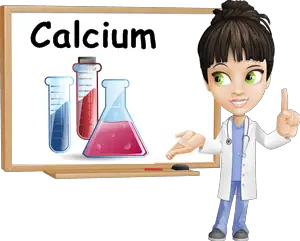As a mineral of dietary importance, calcium is essential for good health. The average person has about 2-3 kilograms of calcium in their body, 99% of which is stored in our bones and teeth. The remaining 1% is found in our blood and cells where it supports numerous life-sustaining metabolic processes. If calcium blood reserves are insufficient, then our body will draw calcium from the bones in order to maintain essential levels in the blood.
This however causes an imbalance that can encourage too much calcium to be taken from our bones.
This process causes fragile teeth, brittle bones and even osteoporosis. Moreover, the excessive consumption of coffee or soda drinks may also reduce the body’s calcium intake.
What is interesting is that we don’t just absorb the calcium we need just because we eat it or take it from dietary supplements. We actually need other nutrients such as magnesium to be able to draw in calcium in our bones and several others to be able to keep it there. It’s a whole process involving several essential nutrients that are required for normal calcium metabolism.

What causes a calcium deficiency?
Several vitamin and mineral deficiencies can cause us to lose calcium from our bones and teeth indirectly. For example, a serious magnesium deficiency can lead to a very poor absorption of calcium. And it’s fairly easy to not get our minimum daily amount of magnesium or lose more of it than normal as a result of perspiration, stress etc. Another important aspect to keep in mind is that absorbing the mineral and keeping it where we need it in the body is greatly influenced by hormonal processes. Similarly, stomach problems, prolonged antibiotic use can cause malabsorption problems which may result in a poor absorption of essential nutrients.
Calcium: benefits and uses
Why is calcium so important for good health? As it is mentioned above, 99% of the calcium in our body is deposited in our bones, where it plays both a structural and a physiological role. So its function is somewhat obvious: it helps build and maintain strong bones and teeth. But calcium boasts other surprising health benefits and functions as well.
Functions of calcium:
- Supports hemostasis, that is, the stoppage of the blood loss via blood clotting processes.
- Regulates the activity of the nervous system via its electrolyte properties, ensuring voluntary and regular muscle contractions, preventing eye twitching, muscle spasms, tingling or numbness in both the upper and lower limbs.
- Helps maintain normal blood pressure and cardiovascular health via its electrolyte activities.
- Builds bones and teeth, contributing to the bone matrix.

Calcium is a mineral of great importance for both children and adults. I would like to underline this idea because adults tends to underestimate their body’s calcium needs. Indeed, children need calcium so their bones develop beautifully and stay strong. But why do adults need just as much calcium? Bones undergo a continuous process of renewal and calcium, like all other nutrients, circulates through the body, is used and gotten rid of.
A constant supply of all essential minerals and vitamins is necessary in order to provide the body with resources to continue basic life-process and preserve a healthy body and mind. A poor diet and bad lifestyle habits will deplete it of all its resources and it will malfunction. Calcium deficiency, for instance, can lead to symptoms such as fragile teeth, brittle bones or osteopenia or even full-on osteoporosis, all thanks to a low bone mineral density as a result of nutrient deficiencies.
Men, women and children can all be affected by osteopenia and osteoporosis. Women have the highest risk of osteoporosis because of increased hormonal activity that alters the way their body uses its calcium. But children can also develop brittle bones and osteoporosis. This occurs either because they don’t get enough calcium in their diet or, just as frequently, because of growth spurts that suddenly increase the body’s requirements of the mineral which aren’t met.
While children need calcium for the development of a strong, healthy bone frame, adults and older people need it to maintain it. But for this, a smart diet and good lifestyle habits are imperative. It is important that calcium-rich foods be present in our daily diet. However, it is just as important to exclude some foods and beverages that can negatively impact calcium absorption.
Research suggest that drinking cola or other sodas and coffee on a daily basis, even multiple times a day, can rapidly deplete our body if essential calcium deposits. How is this possible? Apparently, soda drinks contain phosphoric acid which, if consumed in high amounts, can lead to calcium deficiency and bone loss. The same compound encourage other nutritional deficiencies, especially magnesium. And if we don’t get much calcium to begin with, but don’t get much magnesium either, then we will have even less calcium be absorbed in our bones.
Also, caffeine can also prevent calcium absorption, thus leading to an insufficient intake and possible future deficiencies. Another problem would be the fact that drinking a lot of fizzy drinks reduces our intake of other healthier liquids such as water, milk, orange, carrot or beet juice which would supply our body with extra quantities of vitamins and minerals. Milk, for instance, offers a great start in the morning and provides excellent amounts of calcium. Beet juice is full of antioxidants. Carrot juice is full of dietary fiber and is great for improving transit time and relieving constipation.
About calcium supplementation
If your diet isn’t enough to cover your daily requirements, you can always consider calcium supplements. Of course, it is best to talk to your doctor and get personalized advice. Individual calcium requirements may differ considerably according to gender, weight, age or medical history. For those of you requiring dietary supplements to meet your daily requirements of calcium, remember it is good to take calcium supplements along with vitamin D (to increase absorption) and magnesium (to ensure it goes in the bones, rather than joints, heart valves or artery walls).
Also, here is an interesting fact about calcium supplements: the best forms of calcium are calcium citrate and calcium citrate malate. Calcium carbonate, readily available in most supplement formulas, has a low bioavailability. This means that it is poorly absorbed in the intestinal tract, particularly in people with a long history of digestive problems like ulcers, irritable bowel, food sensitivities or intolerance and others. Also, remember that different forms have different side effects, absorption rates and require different conditions for an optimal absorption (like taking them before eating or after a meal).
How much calcium a day?
Now that you know which calcium forms are absorbed better and how you can increase absorption, you should know why it is never good to exceed 1500 mg per day. Although vital for good bone health, an excess of calcium can, in time, lead to blocked arteries, kidney stones or stiff, painful joints as a result of abnormal calcium deposits. Especially if the diet is lacking in magnesium to help regulate calcium metabolism and optimize absorption of the mineral in bones and teeth. The recommended daily intake for an average adult is of around 1000 mg of calcium a day, with teenagers and older adults requiring a bit more (1200-1300 mg).
Update 2020: As of recently, the recommended daily intake, RDI, of calcium for an average adult is set at 1300 mg a day. This amount is believed to cover daily requirements of the mineral for healthy adults, without risks of side effects.
Conclusion
Experts say, as long as we include calcium-rich foods in our diet and get enough of other nutrients that encourage the absorption of the mineral, like magnesium and vitamin D, we should be good without the dietary supplements. But if we do need calcium supplements, it is best they are taken at the advice of a doctor. Also, one of the best tips for taking calcium is to divide the amount we take daily because the less calcium we take at once, the more of it will be absorbed. The more we take at once, the less we absorb.
